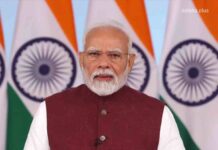OdishaPlus Bureau
 In a politically super-charged Monday in Parliament, Union Home Minister Amit Shah announced that Article 370, which gave special status to the state of Jammu and Kashmir, stands scrapped ‘at once’. By the end of the evening, he made an earnest appeal to everyone opposing the move and also made a case for Jammu and Kashmir (Reorganization) Bill 2019 which was passed in the Upper House 125 votes to 61.
In a politically super-charged Monday in Parliament, Union Home Minister Amit Shah announced that Article 370, which gave special status to the state of Jammu and Kashmir, stands scrapped ‘at once’. By the end of the evening, he made an earnest appeal to everyone opposing the move and also made a case for Jammu and Kashmir (Reorganization) Bill 2019 which was passed in the Upper House 125 votes to 61.
Article 370 related to a special provision in the Constitution which, among others, barred people from rest of the country to buy property in Jammu and Kashmir. Shah tabled the resolutions scrapping Article 370. Article 370 has been abrogated through Constitution (Application to Jammu and Kashmir) Order 2019, signed by President Ram Nath Kovind.
 Moving the Jammu and Kashmir Reorganization bill in the Rajya Sabha amid a huge uproar from the Opposition, Shah informed the state will be split into two Union Territories: Jammu and Kashmir with an Assembly and Ladakh without one.
Moving the Jammu and Kashmir Reorganization bill in the Rajya Sabha amid a huge uproar from the Opposition, Shah informed the state will be split into two Union Territories: Jammu and Kashmir with an Assembly and Ladakh without one.
While BJP’s NDA allies supported the move, some opposition parties like AAP, BSP, BJD, YSRCP and TDP too backed the government. Among those raising concern were Congress, TMC and political parties of J&K. J&K politicians like Mehbooba Mufti and Omar Abdullah even went to the extent of saying that people of Jammu and Kashmir have been betrayed
What has unfolded over the last few days in Kashmir is exactly opposite of the claims by the NDA government, and Prime Minister Narendra Modi himself. Modi has been saying we will win over Kashmir with love, dialogue and good governance. It is the government’s responsibility to reassure the people in times of crisis. But on full display since August 2 is exactly the reverse.
 Through a series of orders, for example the evacuation of NIT students, the government has contributed to the spread of panic and uncertainty in the Valley and in the minds of other Indians, almost as if this was the intention. Most astonishing of all was the abrupt cancellation of the Amarnath Yatra, citing a terrorist threat emanating from Pakistan, and the swift evacuation of tourists and pilgrims from the Valley.
Through a series of orders, for example the evacuation of NIT students, the government has contributed to the spread of panic and uncertainty in the Valley and in the minds of other Indians, almost as if this was the intention. Most astonishing of all was the abrupt cancellation of the Amarnath Yatra, citing a terrorist threat emanating from Pakistan, and the swift evacuation of tourists and pilgrims from the Valley.
Unsympathetically, the order asking them to leave immediately did not address the apprehensions of the people of Kashmir, thus conveying the crude and brute message that the government was not concerned about them, even as they rushed to petrol pumps and ATMs to stock up.

Only weeks earlier, officials had been eager to project the situation in the Valley and at the LoC as much improved, with cross-border infiltration having come down drastically. The U-turn may be based on fresh information, and it is true that the Centre must have the room to take decisions for reasons not always in full public view, but calling off the pilgrimage to Amarnath is virtually an admission that the government cannot prevent terrorist attacks. This, despite the security presence in the Valley, and a new and technologically advanced security deployment specially designed for the pilgrimage.
 Whatever lies behind the government’s decisions of the last few days, the fallout in the Valley cannot be good. That the government has chosen not to offer any explanations even to the leadership of the two main parties, who command a following among Kashmiris in their own right, is a blunder.
Whatever lies behind the government’s decisions of the last few days, the fallout in the Valley cannot be good. That the government has chosen not to offer any explanations even to the leadership of the two main parties, who command a following among Kashmiris in their own right, is a blunder.
Showing separatist politicians their place is one thing. But making a show of contempt for mainstream politicians is ill-advised. Any gains New Delhi has made in the past in the Valley have depended heavily on increasing the number of stakeholders. Now, an unfortunate impression is gaining ground that the Centre is again narrowing and centralizing the decision-making process. Without the support of the Kashmiri people, Delhi’s disconnect with the Valley will only increase.


























